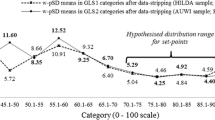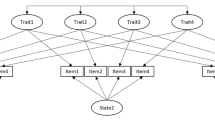Abstract
Subjective well-being (SWB) is an important indicator of quality oflife. SWB can be conceptualized as a momentary state (e.g., mood) aswell as a relatively stable trait (e.g., life satisfaction). Thevalidity of self-reported trait aspects of SWB has been questioned byexperimental studies showing that SWB judgments seem to be stronglycontext dependent. Particularly, momentary mood seems to have a stronginfluence on global SWB judgments. To explore the ecological validity ofthese conclusions a non-experimental longitudinal self-reportstudy with three occasions of measurement was conducted(N = 249). The associations between momentarymood ratings and global judgments of SWB (life satisfaction,satisfaction with life domains, frequency and intensity of emotions) aswell as personality ratings (self-esteem, optimism, neuroticism,extraversion) were analyzed in a multistate-multitrait-multiconstructmodel. This model takes (a) measurement error, (b) occasion-specificdeviations, and (c) stable interindividual differences into account. Itis shown that the variability in global SWB judgments and personalityratings is relatively small and much smaller than the variability inmood. Furthermore, the occasion-specific associations between moodstates, on the one hand, and global SWB and personality ratings, on theother hand, are relatively small and inconsistent. All global SWB andpersonality variables are more strongly related to mood on the traitlevel than on the occasion-specific deviation level. Therefore, incontrast to experimental studies, occasion-specific mood effects do notseem to be inherently important in ecological measurement settings.
Similar content being viewed by others
REFERENCES
Amelang, M., K. Eisenhut and H. Rindermann: 1991, 'Responding to adjective check list items: A reaction time analysis', Personality and Individual Differences 12, pp. 523-533.
Andrews, F.M. and R.F. Inglehart: 1979, 'The structure of subjective well-being in nine western societies', Social Indicators Research 6, pp. 73-91.
Andrews, F.M. and J.B. Robinson: 1991, 'Measures of subjective well-being', in J.P. Robinson, P.R. Shaver and L.S. Wrightsman (eds.), Measures of Personality and Social Psychological Attitudes (Academic Press, San Diego, CA), pp. 61-114.
Andrews, F.M. and S.B. Withey: 1976, Social Indicators of Well-being:America's Perception of Life Quality (Plenum, New York).
Argyle, M.: 1987, The Psychology of Happiness (Routledge, London).
Bachorowski, J.A. and E.B. Braaten: 1994, 'Emotional intensity: Measurement and theoretical implications', Personality and Individual Differences 17, pp. 191-199.
Bentler, P.M.: 1995, EQS Structural Equations Program Manual (Multivariate Software, Inc., Encino, CA).
Billingsley, K.D., C.A. Waehler and S.I. Hardin: 1993, 'Stability of optimism and choice of coping strategy', Perceptual and Motor Skills 76, pp. 91-97.
Blaney, P.H.: 1986, 'Affect and memory: A review', Psychological Bulletin 99, pp. 229-246.
Bradburn, N.M.: 1969, The Structure of Psychological Well-being (Aldine, Chicago).
Bradley, B.P., K. Mogg, A. Perret and M. Galbraith: 1993, 'The effect of depressed mood of personality measures', Personality and Individual Differences 14, pp. 599-601.
Brown, J.D. and T.A. Mankowski: 1993, 'Self-esteem, mood, and self-evaluation: Changes in mood and the way you see you', Journal of Personality and Social Psychology 64, pp. 421-430.
Browne, J.P., H.M. McGee and C.A. O'Boyle: 1997, 'Conceptual approaches to the assessment of quality of life', Psychology and Health 12, pp. 737-751.
Campbell, A.: 1981, The Sense of Well-being in America (McGraw-Hill, New York).
Campbell, A., P.E. Converse and W.L Rodgers: 1976, The Quality of American Life. Perceptions, Evaluations, and Satisfactions (Russell Sage Foundation, New York).
Deinzer, R., R. Steyer, M. Eid, P. Notz, P. Schwenkmezger, F. Ostendorf and A. Neubauer: 1995, 'Situational effects in trait assessment: The FPI, NEOFFI, and EPI questionnaires', European Journal of Personality 9, pp. 1-23.
Diener, E.: 1984, 'Subjective well-being', Psychological Bulletin 95, pp. 542-575.
Diener, E., R.A. Emmons, R.J. Larsen and S. Griffin: 1985, 'The satisfaction with life scale', Journal of Personality Assessment 49, pp. 71-75.
Diener, E. and R.J. Larsen: 1993, 'The experience of emotional well-being', in M. Lewis and J.M. Haviland (eds.), Handbook of Emotions (Guilford, New York), pp. 405-416.
Diener, E. and R. Lucas: 1999, 'Personality and subjective well-being', in D. Kahneman, E. Diener and N. Schwarz (eds.), Foundations of Hedonic Psychology: Specific Perspectives on Enjoyment and Suffering (Russell Sage Foundation, New York), pp. 213-229.
Diener, E., H. Smith and F. Fujita: 1995, 'The personality structure of affect', Journal of Personality and Social Psychology 69, pp. 130-141.
Eid, M.: 1996, 'Longitudinal confirmatory factor analysis for polytomous item responses. Model definition and model selection on the basis of stochastic measurement theory', Methods of Psychological Research — Online 1, pp. 65-85.
Eid, M.: 1997, 'Happiness and satisfaction: An application of a latent state-trait model for ordinal variables', in J. Rost and R. Langeheine (eds.), Applications of Latent Trait and Latent Class Models in the Social Sciences (Waxmann, Münster), pp. 145-151.
Eid, M. and E. Diener: 1999, 'Intraindividual variability in affect: Reliability, validity, and personality correlates', Journal of Personality and Social Psychology 76, pp. 662-676.
Eid, M. and L. Hoffmann: 1998, 'Measuring variability and change with an item response model for polytomous variables', Journal of Educational and Behavioral Statistics 23, pp. 193-215.
Eid, M., P. Notz, R. Steyer and P. Schwenkmezger: 1994, 'Validating scales for the assessment of mood level and variability by latent state-trait analyses. Personality and Individual Differences 16, pp. 63-76.
Eysenck, H.J. and S.B.G. Eysenck: 1968, The Manual of the Eysenck-Personality Inventory (Educational and Industrial Testing Service, San Diego).
Ferring, D., S.-H. Filipp and K. Schmidt: 1996, 'Die “Skala zur Lebensbewertung”: Empirische Skalenkonstruktion und erste Befunde zu Reliabilität, Stabilität und Validatät’ [The “Skala zur Lebensbewertung:” Scale construction and findings on reliability, stability, and validity] Zeitschrift für Differentielle und Diagnostische Psychologie 17, pp. 141-153.
Jöreskog, K.G.: 1979, 'Statistical estimation of structural models in longitudinal investigations', in J.R. Nesselroade and P.B. Baltes (eds.), Longitudinal Research in the Study of Behavior and Development (Academic Press, New York), pp. 303-351.
Kozma, A., S. Stone, M.J. Stones, T.E. Hannah and K. McNeil: 1990, 'Long-and short-term affective states in happiness: Model, paradigm, and experimental evidence', Social Indicators Research 22, pp. 119-138.
Larsen, R.J. and E. Diener: 1987, 'Affect intensity as an individual difference characteristic: A review', Journal of Research in Personality 21, pp. 1-39.
Lewis, L.M., W.N. Dember, B.K. Schefft and R.A. Radenhausen: 1995, 'Can experimentally induced mood affect optimism and pessimism scores?', Current Psychology, Developmental, Learning, Personality, Social 14, pp. 29-41.
Marsh, H.W. and D. Grayson: 1994, 'Longitudinal confirmatory factor analyses: Common, time-specific, item-specific, and residual-error components of variance', Structural Equation Modeling 1, pp. 116-145.
Myers, D.G. and E. Diener: 1995, 'Who is happy?', Psychological Science 6, pp. 10-19.
Pavot, W. and E. Diener: 1993, 'Review of the satisfaction with life scale', Psychological Assessment 5, pp. 164-172.
Robinson, M.D.: 2000, 'The reactive and prospective functions of mood: Its role in linking daily experiences and cognitive well-being', Cognition an Emotion 14, pp. 145-176.
Rosenberg, M.: 1965, Society and the Adolescent Self-image (Princeton University Press, Princeton).
Satorra, A. and P. Bentler: 1994, 'Corrections to test statistics and standard errors in covariance structure analysis', in A. von Eye and C.C. Clogg (eds.), Analysis of Latent Variables in Developmental Research (Sage, Newbury Park, CA), pp. 399-419.
Scheier, M.F. and C.S. Carver: 1985, 'Optimism, coping, and health: Assessment and implications of generalized outcome expectancies', Health Psychology 4, pp. 219-247.
Schuerger, J.M., K.L. Zarrella and A.S. Hotz: 1989, 'Factor that influence the temporal stability of personality by questionnaire', Journal of Personality and Social Psychology 56, pp. 777-783.
Schwarz, N. and F. Strack: 1991, 'Evaluating one's life: A judgment model of subjective well-being', in F. Strack, M. Argyle and N. Schwarz (eds.), Subjective Well-being (Pergamon, Oxford), pp. 27-47.
Schwarz, M. and F. Strack: 1999, 'Reports of subjective well-being: Judgmental processes and their methodological implications', in D. Kahneman, E. Diener and N. Schwarz (eds.), Foundations of Hedonic Psychology: Scientific Perspectives on Enjoyment and Suffering (Russell Sage Foundation, New York), pp. 61-84.
Steiger, J.: 1990, 'Structure model evaluation and modification: An Interval estimation approach', Multivariate Behavioral Research 25, pp. 173-180.
Steyer, R., D. Ferring and M. Schmitt: 1992, 'On the definition of states and traits', European Journal of Psychological Assessment 2, pp. 79-98.
Steyer, R., P. Schwenkmezger, P. Notz and M. Eid: 1994, 'Testtheoretische Analysen des Mehrdimensionalen Bfindlichkeitsfragebogens (MDBF)’ [Theoretical analysis of the multidimensional mood questionnaire (MDBF)]. Diagnostica 40, pp. 320-328.
Veenhoven, R.: 1994, 'Is happiness a trait? Test of the theory that a better society does not make people any happier', Social Indicators Research 32, pp. 101-160.
William, R.L., M. Eyring, P. Gaynor and J.D. Long: 1991, Psychology and Health 5, pp. 165-181.
Author information
Authors and Affiliations
Rights and permissions
About this article
Cite this article
Eid, M., Diener, E. Global Judgments of Subjective Well-Being: Situational Variability and Long-Term Stability. Social Indicators Research 65, 245–277 (2004). https://doi.org/10.1023/B:SOCI.0000003801.89195.bc
Issue Date:
DOI: https://doi.org/10.1023/B:SOCI.0000003801.89195.bc




